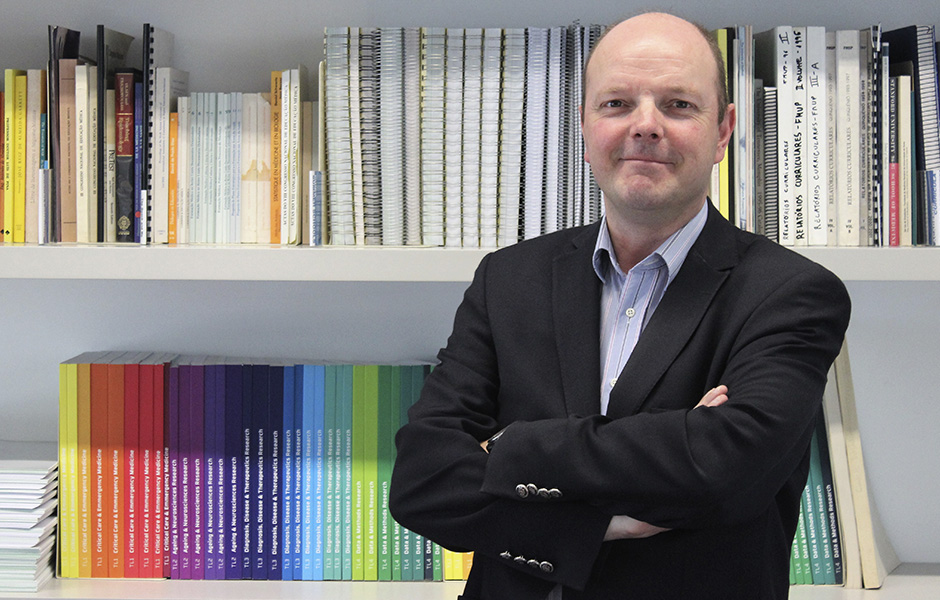Paulo Santos is an integrated researcher at CINTESIS – Center for Health Technology and Services Research, where he leads the PrimeCare research group, as well as the METIS and HYGEIA projects, which he combines with teaching and his practice as family doctor.
He was born 47 years ago at the Alfredo da Costa Maternity Hospital in Lisbon, but he was still a child when he moved to Vila Nova de Gaia with his parents and siblings. He studied at the Boarding School of Carvalhos and entered the Faculty of Medicine of the University of Porto (FMUP) in the academic year 1989/90. “I have always wanted to be a doctor and from very early there were people who predicted this future, even when I was first in the family to follow this path. First, I wanted to be a surgeon. I liked the environment of the operating theater.” He eventually decided to be a family doctor and began studying the Family Medicine specialty (then known as General Practice) in 1998. He completed his internship at the Arcozelo Health Center (now part of the ACES Gaia/Espinho) and concluded the specialty in 2002, completing compulsory military service in the meantime.
He considers that his career path has been decided by opportunities he has grasped. In 2003, he was working at the Oliveira do Douro Health Center, when he received an invitation from Alexandre Sousa Pinto to work at the São João Health Center, which at the time was part of the formerly General Clinic Department of FMUP. He accepted the invitation and stayed there until the closure of that healthcare project in 2011. “It was a very interesting project. The current Family Health Units (USF) learnt a lot from our experience. It was like a trial” he says, confessing that he still nurtures the dream of contributing to the creation of a university clinic.
He then started working at the Family Health Unit of São João of Porto while teaching as an Assistant at FMUP. In 2014, he finished his doctorate and opted for his academic career, joining FMUP as a Full-time Assistant Professor. To continue his medical practice and maintain contact with patients were sine qua non conditions, although now his medical practice is carried out in private health units. “A doctor breathes with his patients, is part of his DNA, it cannot be otherwise,” he believes.
As a researcher, he has been a member of CINTESIS for several years, leading a new research group, PrimeCare, since 2018. This year, the team has gained new members, in a clear sign of expansion.
“Nobody does research alone. Our researchers have been working in areas like Preventive Medicine, Health Literacy and Primary Health Care, including Health Systems Assessment, Contracting, and Economic Sustainability long before joining our group. This is where we want to go. We want to join efforts to have projects that provide answers to the problems of people, citizens who use health services or health professionals who can also have the strength to convince funding agencies,” he says.
Also in the context of CINTESIS and the Department of Community Medicine, Health Information and Decision of FMUP, he continues to develop his work as coordinator of the METIS project, aimed at promoting health literacy.
“There has to be a normalization of language, it has to be clear and accessible, so that the decision can be shared and health outcomes can be improved. Our aim is not to create a perception of the threat of disease, or to advertise more or less innovative treatments, leading to a potential increase in the number of consultations, but rather that people can autonomously solve a huge set of situations related to health on a daily basis,” he explains.
He is also responsible for HYGEIA, a project that goes further and not only provides information but also trains the skills of ninth graders in this field with the aim of preventing sexually transmitted diseases, namely HIV/AIDS.
The future, he says, will include the consolidation and growth of the research group he leads and our contribution to the reform of Primary Health Care.
What is your 1-Year Ambition?
This year, the ambition is to consolidate the growth of the research group PrimeCare and joint projects at the national level that could create the conditions to compete for more funding.
What is your 10-Year Ambition?
I think we will necessarily have a Government that says what it wants in the health area. This will mean an evolution in the reform of Primary Health Care (PHC). I expect an evolution of the family health units towards a greater management balance between profit and risk. This implies work. In this case, it makes sense that university research centers produce and validate knowledge in this area and as researchers we expect to have an active voice.
How is life beyond teaching and research?
Lately, I have been more dedicated to gardening. It is a great leisure activity. Of course, I also spend time with my family, my wife and my four children, between the ages of 12 and 17. My family is fundamental in my life.

